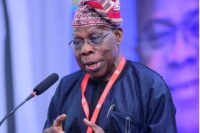From Ismail Omipidan, Abuja
Adebayo Oyenubi is a graduate of Quantity Surveying, Obafemi Awolowo Univeristy, Ile Ife. He holds a Master’s degree in Project Management from the George Washington University, District of Columbia, United States.
An experienced quantity surveyor with over two decades of working experience across various sectors of the built environment in different locations in the United
States, Oyenubi presently works as a Senior Cost
Consultant/Project Cost Lead for Turner & Townsend for Data Centre projects.
In this interview, Oyenubi, who is a professional member of the Nigeria Institute of Quantity Surveyors, Royal Institute of Chartered Surveyors, and the Canadian Institute of Quantity Surveyors, speaks on building collapse in Nigeria, how Nigerians in diaspora can contribute to ensuring housing for all in Nigeria and the steps the Nigerian government can take to build environmental-friendly mass housing, among others.
President Tinubu’s administration, at its inception, promised mass housing for Nigerians. Recently, the Housing Minister reeled out some of the efforts the government has been making in that direction. What is your take?
Sustainable housing is a laudable idea and can be a route to housing for all. The “how” however is a totally different ball game. With my background in cost & commercial management, I would look at this from four different categories and I think looking at what the minister revealed, I can classify his efforts into some of the categories.
The four are as follows: Government-led initiatives; the renewed hope cities and estates programme, the renewed hope social housing programme, strengthening institutional capacity, falls under this category, and 90 per cent of what the minister listed falls under this category. My only addition to this will be that the government introduce incentives to both owners and professional practitioners. All of these culminate into one end of the transaction. The other end of the transaction deals with the recipients, the citizenry. The government needs to execute adequate information dissemination to have a response from the citizenry.
The next is sustainable building practice. This deals with the professionals in different fields of the built environment – architects, engineers, quantity surveyors, project managers etc. They are needed to allow for a thorough update of the National Building Code to promote sustainable development. I know there is the Green Building Council of Nigeria, and they could be of tremendous help here. The result of the influence of these professionals will cover issues like the use of local building materials and the carbon footprint of such materials, energy efficiency, water conservation and waste management practices proposals and standards.
Innovative financing policy on the other hand is where I approach this as a Cost & Commercial manager in the built environment. The built environment has a lot to do with the “perception of trust” and this perception thrives on transparency. This is where the rubber meets the road when it comes to financing in Nigeria. The present construction funding approach in Nigeria may need to be crafted to be more adaptable to sustainable construction with deliberate and intentional incentives. Incentives like tax breaks, subsidies, grants to developers building sustainable homes as well as homeowners too. Further incentives for low-cost housing development across targeted areas of production to stem migration etc. And finally: technological advancement. This is a broad, as it goes beyond just a couple of solar panels placed on a roof structure or a solar farm. I am talking about a holistic view of renewable energy supply, the use of modular and prefabricated homes, especially those of very low carbon foot print. As energy becomes more stable, the smart home technology for energy efficiency management becomes an added advantage. Even the digitisation of real estate and property transactions to remove inefficiencies that affect decision-making processes.
What kind of policies do you think the Nigeria government can introduce to ensure sustainable housing?
The reeled-out policies by the minister are a good place to start, but we all know policies are only good on paper if there is no action to follow through. The big question is how to follow through. If the present policies are practised with a lot of transparency such that the citizenry can attest to that transparency, then additional policies will make sense and make a difference. Until then, we may only be having all actions no movement.
How can Nigerians in the diaspora contribute its own quota to sustainable housing development in Nigeria?
Nigerians in diaspora can contribute their quota in a lot of ways, assuming trust is not to be abused. If trust is not abused and that perception is real to those abroad, then the following are ways to make that contribution happen.
Direct Investment. Everyone wants a place to call their own and a significant amount of Nigerians abroad subscribe to that without thinking twice, which in turn means funding their personal building projects. This can be in the form of
real estate investment or property ownership investment.
Utilizing diaspora focused schemes. For example, the Diaspora Mortgage loan, which is a collaboration between the Federal Mortgage Bank (FMB) and the Nigeria in diaspora commission is a platform for consideration.
Collaborative initiatives where Nigerians in diaspora can partner with known and trusted developers. The caveat here is due diligence, market research and adequate planning, and lastly, reputable partners in the partnership.
You have lived in Nigeria, and you currently live abroad. What are the things being done right over there that we can emulate here in Nigeria to guarantee sustainable housing?
There is a lot to unpack here but I shall try to categorise what I believe should be done for ease of communication. So, let’s look at the financial and nonfinancial incentives to enable ease of understanding. Focus and Spotlight on Certification: The United States and other developed economies for example have a higher focus on sustainable/green building certification and these come with alluring financial incentives to both the homeowner and developer due to the standards enshrined in these certifications. For example, LEED certified buildings are given tax rebates from the Federal, State and Local authorities. Funding opportunities with rebates and grants for LEED certified buildings, property tax incentives after the building, which is an added incentive to the homeowner. Some LEED project have expedited permitting (building approvals) and/or reduced permitting (building approval) fees.
Lastly there are favourable financing options from some states and local government. The Nigerian government leaning into this would go a long way putting these incentives within reach. There is also financial incentive to the homeowner. There is also the reduced operating cost on the structure after its completed compared to the traditional structures. However, there can be no such incentive if the Nigerian government does not lead the initiative.
The Awareness factor: There is a higher level of awareness in the western world more than in Nigeria. Environmental awareness and acknowledgement of climate change and its attending risk and awareness of government incentives (tax credit and grants) which plays in consumer demand for sustainable houses as a product. Growing awareness of the link between energy efficiency and indoor air quality, leading to green building standards that aim for improved indoor environmental health. The Nigerian government can flip the script by making information more available to educate the populace about the concept. The late Dora Akunyili did it in her time as have many others.
Easier access to credit and finance is another area the Nigerian government can tap into. Sustainable housing is often seen as affordable housing which makes it cheaper in principle. However the accessibility to credit and financing, especially to the final homebuyers is more readily available in the western world compared to Nigeria.
Economic instability and inflation are also another matter for consideration. A stable economic environment allows for long-term investment, which in turn increases the steady production of sustainable construction projects. Fluctuation in currency values leads to higher prices, rising costs of construction materials, which negatively impact project budgets and timelines, leading to cost overruns and delays.
Transparency and high-level risk perceptions is also a factor. Lack of transparency in project procurement processes which make risk assessment difficult for investors and discourages both traditional and innovative financing options. High-risk regulatory uncertainties, and challenges in project regulatory approval and bankability make it difficult to attract private capital at scale. These two components need to be cleaned up for positive perception to be developed in this sector.
What do you think is the solution to incessant building collapse in Nigeria?
This can be done from two perspectives. The first is avoiding the collapse, and the second is managing the collapse. Avoiding collapse is easier and though it does have a retinue of dos and don’ts. Strengthening regulation and the enforcement of such regulations (building codes, permit issues, construction monitoring to mention a few), material quality control measures and record keeping, professional training (training and retraining of all professional personnel and trade personnel), public awareness (educating the public of dangers and repercussions of building collapse), supervision and monitoring of all construction processes and procedures, integration of various governing bodies, agencies and professional organisations. However, managing the collapse is where punitive measures come into play for defaulting people found lacking in their responsibilities on the building project, not just to punish but to serve as deterrents.
Finally, do quantity surveyors have any role to play in ensuring sustainable housing in Nigeria?
The essential rationale of a quantity surveyor in sustainable housing is Cost & Commercial Management with a slight variance from what obtains in traditional construction. Sustainable cost estimation, slightly different from traditional cost estimation as this considers the long-term costs of sustainable materials, energy-efficiency, technologies, and environmentally friendly practices. The long-term cost will further include whole lifecycle costing of the project to provide a holistic financial implication of the project even after it’s been built, giving visibility to the homeowner in seeing clearly all financial responsibilities.
Budget optimisation and cost control deals with the process from preconstruction to project control. Here, the quantity surveyor (Cost & Commercial manager) monitors, tracks, and forecast all cost implication related matters and documenting same for lessons learnt. The change order management, cost variance analysis, monthly payment applications (monthly valuation in Nigeria), monthly cost reports just to mention a few are all tied into these functions. Sustainable procurement, unlike traditional construction where the cost quality play an essential role in pricing, the added characteristics of environmental friendliness of the materials and products is also a major consideration. In some cases, the manufacturing processes (in how environmentally friendly they are) of the manufacturers also play a role. And carbon footprint management, which deals with estimating and managing the carbon footprints of the different materials in the project is also added value that the quantity surveyor focused on Cost & Commercial Management of the project brings to the table.

















Leave a comment